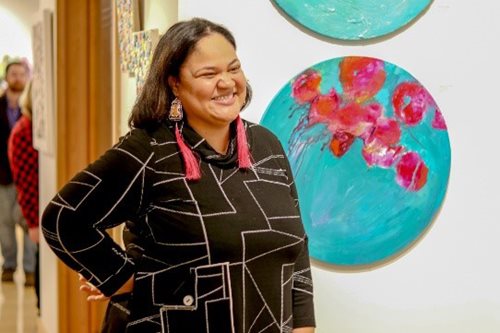Lory Ivey Alexander: Reclaiming Her Own Space
August 20, 2020
The D.C. Bar presents the series “Conventionally Unconventional: Wellness Practices During the Pandemic,” spotlighting how D.C. Bar members are maintaining their mental health and assisting others using unconventional means in this time of crisis.
If you are a part of the D.C. art scene, you may be familiar with Lory Ivey Alexander. Best known for her use of color in paintings and collage, she creates textured layers to tell the stories of American triracial people — black, white, and Native American. In her other professional role, Ivey Alexander supervises a team of more than 30 attorneys and other support staff at the Consumer Protection Branch of the U.S. Department of Justice. If you ask her, she’ll tell you she sees no division between her artist and lawyer roles.
“Being an artist is who I am; it is a way of seeing and understanding the world. But I believe it is important for all lawyers to remember that lawyering is creative, transformative work. We may not all be artists, but we all can draw from a creative well,” she says.
The global pandemic has done little to slow the pace of her day job. “While we continue to work at our usual pace, good management during unrest is different than on an average day in the office. Now, I rely heavily on my human resources consulting expertise to effectively navigate and balance personal needs and professional expectations in an unpredictable, ever-changing world,” says Ivey Alexander.
“All business leaders are facing similar challenges, of course, but lawyers can’t shut down even if the world comes grinding to a halt. We keep moving ahead with our work, even as our lives and the world around us are in chaos. It is the biggest challenge of service-driven work,” she adds.
 Ivey Alexander hopes that her impact in the office and in the studio will help to push the needle forward to better society and foster community. “As a manager, I try to bring dignity to deserving people and build skills that will support them in the long term. In art, I want to create space for people to breathe and process forgotten stories.
Ivey Alexander hopes that her impact in the office and in the studio will help to push the needle forward to better society and foster community. “As a manager, I try to bring dignity to deserving people and build skills that will support them in the long term. In art, I want to create space for people to breathe and process forgotten stories.
I believe that art heals by helping people examine history,” she says.
How does she find time for self-care while working two jobs as an artist and a lawyer? Primarily, she is raising an extensive garden and practicing yogic breathing exercises. She also creates mental and physical spaces that allow her to maneuver the pressures of the world while staying grounded. “We have to figure out what our boundaries are and understand that they are rational. Find what keeps you sane. We must remember we are surviving traumatic events and processing shared trauma,” she says.
She advises attorneys to prioritize their own mental health. “Reclaim your own space. My work-from-home boundaries include limiting video calls and having a time window in which I allow people to ‘enter’ my office. I have also limited what news I consume and how often I consume it. At the end of the day, I need to preserve Lory. The world will do what it does,” Ivey Alexander says. She also sets aside time for personal art and staying active. “The art I make for myself now will likely end up in some future finished pieces,” she says.
Most recently, Ivey Alexander staged her solo show “Foremothers” at George Mason University and exhibited another large body of work at Facebook’s D.C. offices. She is the founder of Abstract Sisterhood, a collective of women artists specializing in abstract and conceptual art, and one of the founders and current co-clerk of the Sidwell Friends Black Alumni Alliance’s Advisory Council.
Ivey Alexander’s next art exhibition will be “Radical Reimaginings," sponsored by 516 ARTS, starting August 22. Follow her art as it unfolds at loryivey.com.
June P. Johnson is an attorney, yoga instructor, and founder of True Bliss Television.





